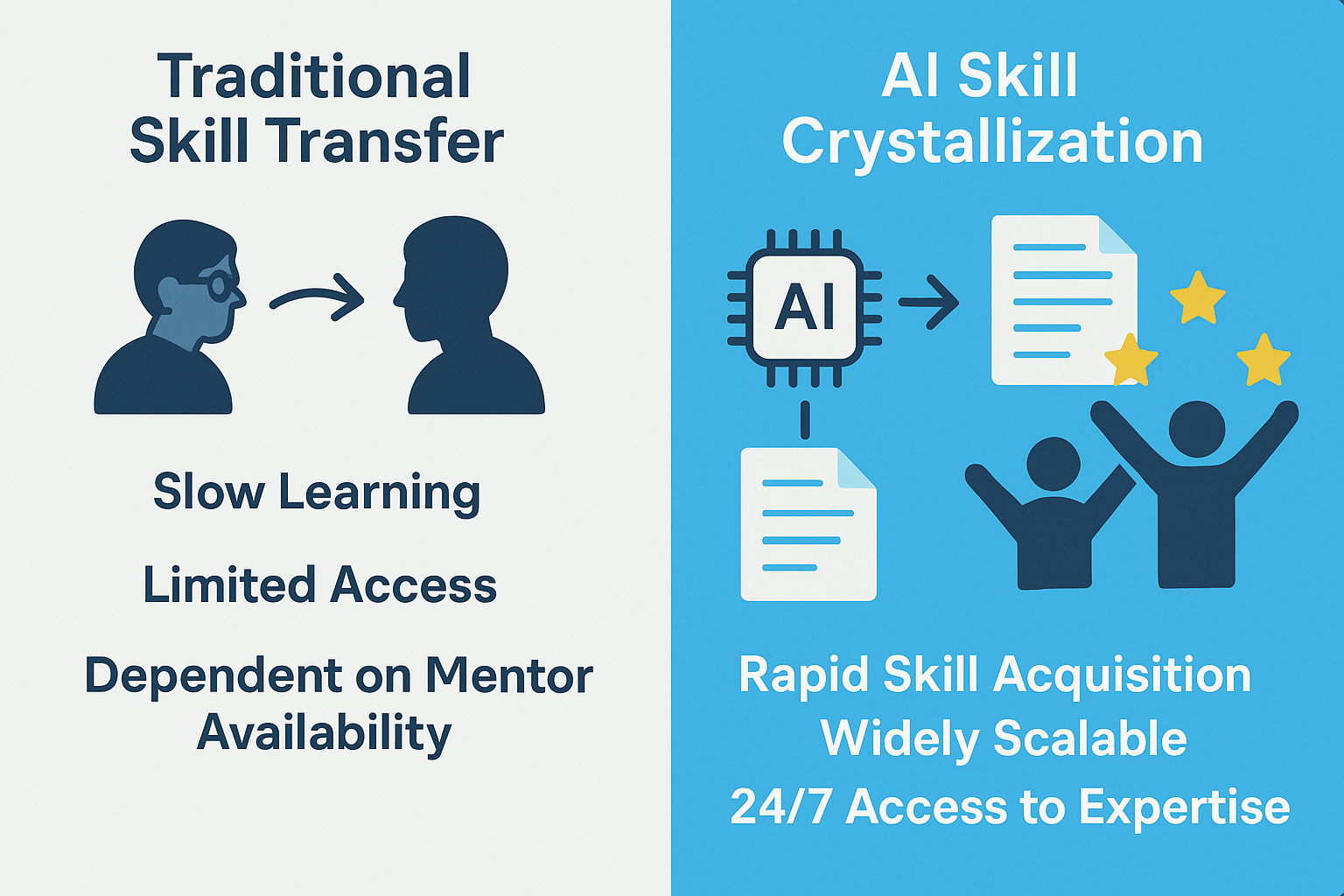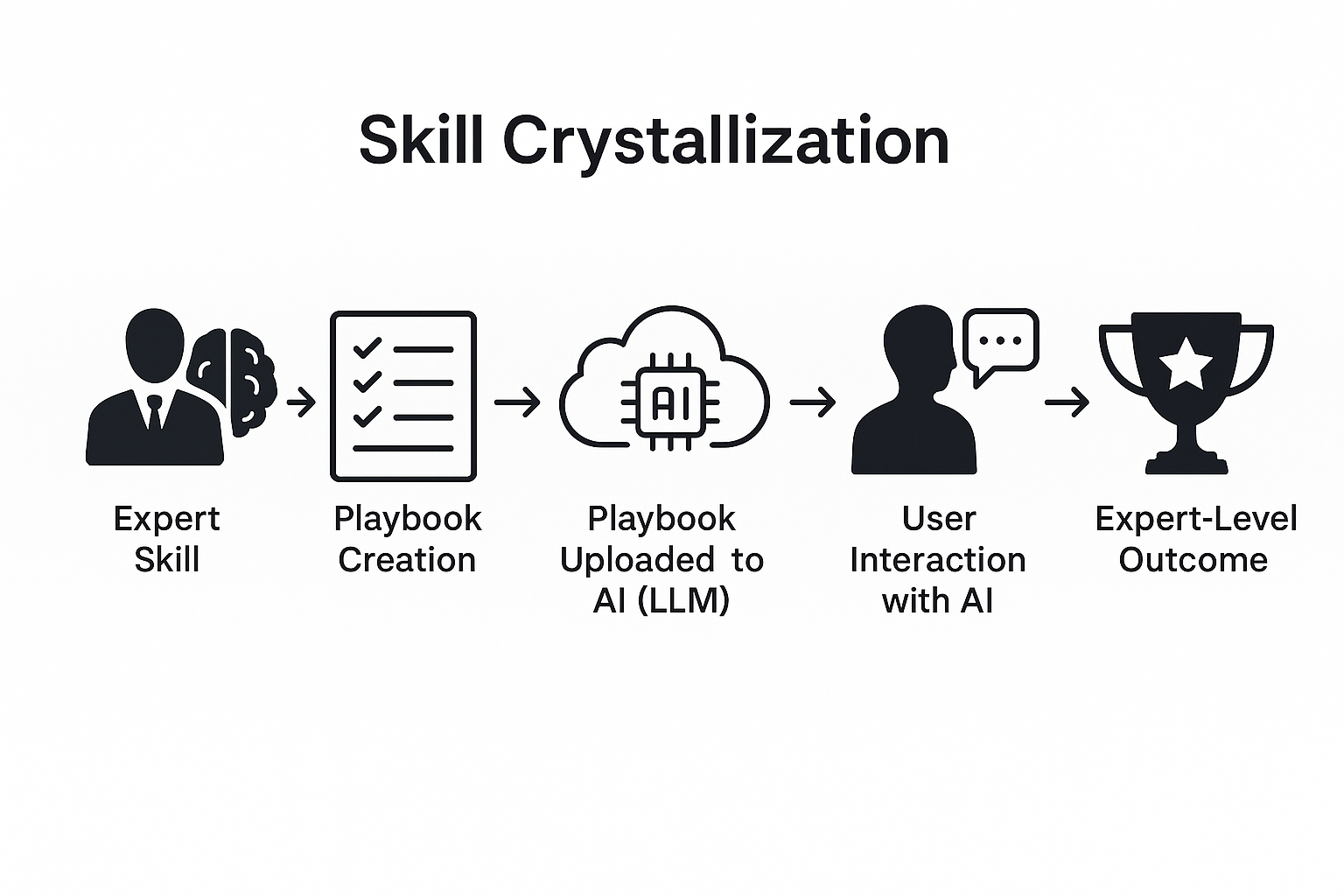
Skill Crystallization—Scaling Expert Ability with AI
The New Alchemy of Expertise
Imagine being guided through writing by Stephen King himself—his voice gently steering your pen, correcting your pace, tone, and structure as you write. King’s book On Writing famously provides insights into his creative process, allowing aspiring writers glimpses into his expertise. But what if these insights could be actively deployed, crystallized through an AI-powered playbook that helps anyone consistently produce expert-level writing?
This idea—skill crystallization—is the art of capturing and replicating expert abilities through detailed playbooks that AI can dynamically guide users through. Rather than simply documenting processes, crystallization encodes nuanced judgments, taste, and intuition, making specialized expertise widely accessible.
From Intuition to Instructions
Traditionally, expertise was passed slowly, through years of mentorship, apprenticeships, and hands-on experience. Historical examples, like recipe books for cooking or Toyota’s lean manufacturing manuals, already served as primitive playbooks—structured instructions allowing knowledge transfer. Pixar famously documented creative processes to consistently produce compelling stories.

However, AI introduces a radical shift: playbooks are no longer static guides but dynamic tools that can scale nuanced expertise beyond human constraints. This advancement dramatically accelerates learning curves and significantly expands the accessibility of specialized knowledge.
Examples of Skill Crystallization
Example 1: Writing Expert Essays Using a structured Conversation-to-Essay playbook, AI dynamically guides the writer from initial ideas to polished essays, ensuring adherence to best practices in clarity, style, and persuasive power. The AI continuously provides structured feedback at critical checkpoints, aligning the writer’s output closely with expert standards.
As a concrete illustration, this very blog post was drafted using such an essay playbook. You can see the GPT4.5-guided process in action in this ChatGPT conversation (open in browser), which also utilized the Superwhisper tool for voice input.
Example 2: Product Requirements Documents (PRDs) In product management, crystallized skills via a PRD-writing playbook enable product managers, even those new to the role, to produce detailed, expert-quality documents. AI ensures every section—from objectives and success metrics to risks and mitigations—is articulated clearly and professionally, preserving and scaling the expertise of seasoned product leaders.
Example 3: Executive Coaching for Leadership Development Executive coaching traditionally involves personalized guidance to enhance leadership and emotional intelligence. Crystallizing this skill involves documenting proven coaching frameworks, reflective questions, and improvement strategies into structured playbooks. AI then dynamically facilitates these structured interactions, guiding users through personalized leadership growth paths previously only available through costly coaching sessions.
What Exactly is Skill Crystallization?
Skill crystallization involves systematically capturing the subtle judgments, decisions, and intuitive leaps that define true expertise and embedding them within structured, interactive guidelines—playbooks. Unlike basic procedural manuals, these playbooks use conditional logic, reflective checkpoints, and carefully posed questions to preserve complexity and depth.
Think of it as freezing expertise in amber—preserving and amplifying the essential qualities that set experts apart. This enables a dynamic learning process where AI helps users achieve nuanced outcomes previously limited to direct human mentorship.
How Playbooks and LLMs Work Together
The process of crystallization and deployment is straightforward:

- An expert distills their skills into a detailed, structured playbook, outlining critical decisions, reflective questions, and nuanced goals.
- The playbook is uploaded to an LLM (Large Language Model), training it to enforce the playbook’s judgment-based checkpoints and outcomes.
- Users interact dynamically with the AI, which guides them through the playbook, ensuring adherence to expert standards.
Tools like OpenAI’s Canvas become particularly effective, allowing users to visualize, edit, and interact dynamically with structured content during the AI-guided creation process. AI-integrated IDEs like Windsurf and Cursor further enhance usability by letting users view and directly modify structured content alongside AI-facilitated conversations, ensuring seamless updates and continuous improvement.
Democratizing Expert Outcomes
Skill crystallization radically reduces barriers to acquiring sophisticated skills. Novices can now rapidly achieve expert-level results, transforming education, workforce training, and innovation. With structured AI-assisted guidance, anyone can produce work comparable to seasoned professionals, democratizing access to advanced skills and dramatically accelerating skill acquisition.
Limits and Risks
Critics might argue that playbooks oversimplify skills, risking the loss of critical nuance and creativity. However, this primarily depends on the playbook’s quality. Expertly designed playbooks preserve essential subtleties through reflective checkpoints and detailed judgment-based guidance.
Some skeptics question the applicability of crystallization to inherently human skills like emotional intelligence or leadership. Yet executive coaching already documents structured guidance for such skills—effectively creating crystallizable playbooks. While full automation of emotional nuance may be challenging, structured guidance through playbooks and AI is entirely feasible.
Finally, concerns about diminished originality miss a crucial point: innovation is rarely about isolated originality but rather about thoughtfully building upon previous knowledge. Playbooks provide scaffolding similar to mentorship or collaboration, fostering rather than stifling creativity.
The Future of Expertise
Ultimately, playbooks and LLMs do more than scale processes—they scale judgment, creativity, and nuanced expertise itself. This new alchemy of skill crystallization offers a vision of a world where expert-level outcomes become widely accessible. Imagine what we could crystallize next, and the transformative impact this could have on human potential.
Try It Yourself: Experience Skill Crystallization
To help you experience this firsthand, I’ve prepared a couple of example playbooks based on the concepts discussed:
- Download the Essay Writing Playbook: Sharpen your essay writing skills with guided prompts and structure.
- Download the Product & Business Documentation Playbook: Develop clear and effective documentation for your product or business ideas.
Here’s how to get started:
- Begin a new chat session with a capable Large Language Model (LLM) like GPT-4o. For some reason, the playbooks seem to work better with base models than with reasoning models so try to stick with 4o/Sonnect3.7/DeepseekV3.
- Upload your chosen playbook document at the start of your conversation.
- Start discussing your essay topic, product idea, or business concept with the AI. The LLM will use the playbook to guide your thinking and help you structure your output.
Pro Tip for a Seamless Flow: This interactive process is often best experienced using a dictation tool. Tools like Superwhisper, OpenAI’s Whisper, or even the native dictation features on your computer or phone can make the back-and-forth conversation with the AI much more fluid and natural. Speaking your thoughts can significantly speed up the process and make it feel more like a collaborative session.
I encourage you to try them out and see how skill crystallization can amplify your own abilities!